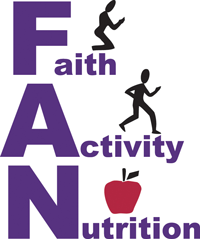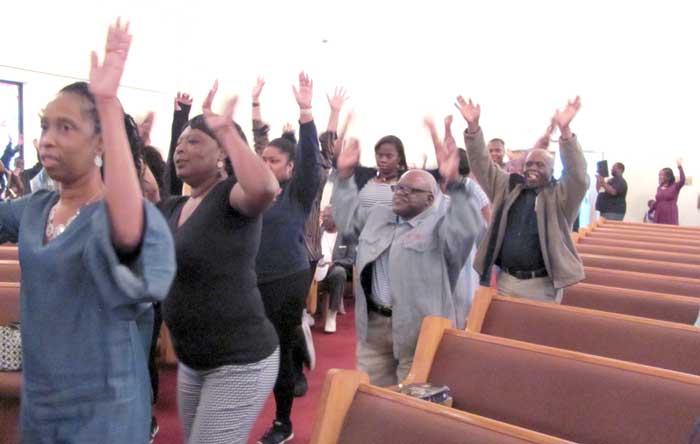Faith, Activity, and Nutrition
- Need: To increase healthy eating and physical activity levels in Fairfield County, South Carolina.
- Intervention: Community health advisors trained church committees and delivered telephone-based technical assistance to improve opportunities, guidelines, messages, and pastor support for physical activity and healthy eating.
- Results: In a 2018 study, churchgoers reported seeing more opportunities for physical activity as well as more messages and pastor support for physical activity and healthy eating. Intervention churches also had fewer inactive churchgoers, compared to control churches.
Evidence-level
Promising (About evidence-level criteria)Description
According to County Health Rankings & Roadmaps, Fairfield County, South Carolina, is ranked 36th in health outcomes out of 46 counties. Ranking factors include adult obesity (43% of Fairfield County adults are considered obese, compared to a statewide average of 36%) and poor access to exercise opportunities (11% of the county population has access to places for physical activity, compared to a statewide average of 65%).

Faith, Activity, and Nutrition (FAN) worked to improve church environments' opportunities for physical activity and healthy eating with the goal of improving health behaviors and health outcomes. FAN worked with churches of multiple denominations; 57% of the county population is African American. Trained laypeople called community health advisors (CHAs) delivered a one-day training to church committees of 3 to 5 volunteers, including pastors, to encourage healthy eating and physical activity among churchgoers and incorporate healthy choices into church activities. A program coordinator in the church coordinated the activities that churches put into place. The CHAs provided brief technical assistance calls to pastors and the church program coordinator over 12 months.
The CHAs were trained for this role through online training modules and a one-day, in-person training. These CHAs then received booster trainings three times during the year to support them in their role of working with the churches.
FAN partners included Fairfield Behavioral Health Services and Fairfield Forward. Training for church committees was conducted in the local district office. The University of South Carolina Prevention Research Center received a 2014-2019 CDC grant to be one of 26 Health Promotion and Disease Prevention Research Centers. This funding supported study of the program's dissemination, implementation, and effectiveness.
The University of South Carolina Prevention Research Center received a 2019-2024 CDC grant to conduct a national implementation study of FAN. The church committee training was converted to an online program, and 107 churches from 23 states across the United States and representing 27 different religious denominations were enrolled in the study. Church-level implementation outcomes and member-level outcomes (in a subsample of churches) will be available in Spring 2024.
The original study has ended, but online training is available.
Services offered
CHAs delivered a one-day training to church committees and provided one year of technical assistance via monthly phone calls. During the training, participating church committees learned about the following topics concerning healthy eating and physical activity:
- Creating opportunities for healthy eating and physical activity before, during, or after church events
- Setting guidelines and policies for healthy eating and physical activity
- Sharing messages (such as bulletin inserts) about healthy eating and physical activity with churchgoers
- Engaging pastors
After the training, church committees created a church program plan and budget, hosted a kick-off event for the congregation, held regular committee meetings, and implemented the new programming.

Results
In a 2018 dissemination and implementation study, 42% of the county's churches received training, and 1,308 churchgoers completed questionnaires about their fruit and vegetable intake, physical activity levels, and perceptions of their church environment:
- 71.68% of the intervention group reported seeing fruits and vegetables offered at church events "almost all of the time," compared to 62.63% of the control group
- 27.2% of the intervention group reported eating the recommended amount of fruits and vegetables, compared to 24.2% of the control group
- 9.8% of the intervention group reported being inactive, compared to 15.7% of the control group
- Intervention churches were significantly more likely to report a healthy church environment than control churches
In a 2018 study describing the CHAs, church committee members were asked at the end of the training if they agree or disagree with statements in the evaluation (1 = strongly disagree, 4 = strongly agree). The following are the mean scores of the intervention group's and control group's response (the control group received the same training one year after the intervention group):
- 3.56 (intervention) and 3.51 (control): "I am confident that I have the skills to put the physical activity part of the program in place in my church"
- 3.53 (intervention) and 3.45 (control): "I am confident that I have the skills to put the healthy eating part of the program in place in my church"
- 3.66 (intervention) and 3.67 (control): "I am confident that I can work with the pastor and other church leaders to put the program in place in my church"
Phase 1 of this program targeted Fairfield County, while Phase 2 implemented FAN statewide through the South Carolina United Methodist Conference. A 2020 Translational Behavioral Medicine article indicated that Phase 2 led to significant improvements (from pre-training to 12 months post-training) in messages, opportunities, policies, and pastor support for physical activity and healthy eating.
A 2020 Frontiers in Public Health article examined the organizational maintenance of FAN in Fairfield County churches. Results indicated that implementation of physical activity and healthy eating components at 24 months was significantly greater compared to pre-training. Two years after FAN implementation, most churches kept at least one program component going.
FAN is indexed in the National Cancer Institute's Evidence-Based Cancer Control Programs, based on a 2013 study.
For more detailed information on program results:
Wilcox, S., Saunders, R.P., Stucker, J., Kaczynski, A.T., Day, K.R., Kinnard, D., … & Bernhart, J.A. (2023). A Process for Converting an In-Person Training to Increase Church Capacity to Implement Physical Activity and Healthy Eating Practices and Policies to an Online Format. Translational Behavioral Medicine, 13(4), 226-235.
Saunders, R.P., Wilcox, S., & Hutto, B. (2022). Influence of Implementation Strategies on Implementation Outcomes in a Statewide Dissemination of Faith, Activity, and Nutrition (FAN). Health Education Research, 37(6), 420-433. Article Abstract
Wilcox, S., Day, K.R., Saunders, R.P., Jake-Schoffman, D.E., Kaczynski, A.T., Stucker, J., … & Bernhart, J.A. (2022). The Faith, Activity, and Nutrition (FAN) Dissemination and Implementation Study: Changes in and Maintenance of Organizational Practices over 24 Months in a Statewide Initiative. International Journal of Behavioral Nutrition and Physical Activity, 19, 23.
Bernhart, J.A., Wilcox, S., Saunders, R.P., Hutto, B., & Stucker, J. (2021). Program Implementation and Church Members' Health Behaviors in a Countywide Study of the Faith, Activity, and Nutrition Program. Preventing Chronic Disease, 18, E05.
Hutto, B., Saunders, R.P., Wilcox, S., Jake-Schoffman, D.E., Bernhart, J.A., Dunn, C.G., … & James, K.L. (2021). Pathways of Influences Leading to Adoption of the Faith, Activity and Nutrition (FAN) Program in a Statewide Initiative. Evaluation and Program Planning, Epub ahead of print. Article Abstract
Wilcox, S., Jake-Schoffman, D.E., Saunders, R.P., Kinnard, D., Kaczynski, A.T., Hutto, B., & James, K.L. (2021). Predictors of Implementation in the Faith, Activity, and Nutrition Dissemination and Implementation Study: Application of the Consolidated Framework for Implementation Research (CFIR) in a Statewide Initiative. Translational Behavioral Medicine, 11(2), 419-429.
Wilcox, S., Saunders, R.P., Jake-Schoffman, D., & Hutto, B. (2020). The Faith, Activity, and Nutrition (FAN) Dissemination and Implementation Study: 24-Month Organizational Maintenance in a Countywide Initiative. Frontiers in Public Health, 8, 171.
Sharpe, P.A., Wilcox, S., Stucker, J., Kinnard, D., Bernhart, J., & James, K.L. (2020). Community Health Advisors' Characteristics and Behaviors, Role Performance, and Volunteer Satisfaction in a Church-Based Healthy Eating and Physical Activity Intervention. Journal of Community Health, 45(1), 88-97.
Bernhart, J.A., Dunn, C.G., Wilcox, S., Saunders, R.P., Sharpe, P.A., & Stucker, J. (2019). Church Leaders' Barriers and Facilitators Before and After Implementing a Physical Activity and Nutrition Intervention. Health Education Research, 34(2), 188-199. Article Abstract
Saunders, R.P., Wilcox, S., Jake-Schoffman, D.E., Kinnard, D., Hutto, B., Forthofer, M., & Kaczynski, A.T. (2019). The Faith, Activity and Nutrition (FAN) Dissemination and Implementation Study: Phase 1 Implementation Monitoring Methods and Results. Health Education & Behavior, 46(3), 388-397.
Wilcox, S., Saunders, R.P., Kaczynski, A.T., Forthofer, M., Sharpe, P.A., Goodwin, C., ... & Hutto, B. (2018). Faith, Activity, and Nutrition Randomized Dissemination and Implementation Study: Countywide Adoption, Reach, and Effectiveness. American Journal of Preventive Medicine, 54(6), 776-785.
Sharpe, P.A., Wilcox, S., Kinnard, D., & Condrasky, M.D. (2018). Community Health Advisors' Participation in a Dissemination and Implementation Study of an Evidence-Based Physical Activity and Healthy Eating Program in a Faith-Based Setting. Journal of Community Health, 43(4), 694-704.
Challenges
In a 2019 barriers and facilitators study, most pastors and program coordinators perceived no barriers to putting FAN into place in their church. The most common barrier reported by pastors and program coordinators was that their congregation might be hesitant to change their eating and exercise habits and may not participate in programming. They also reported lack of motivation or interest among some members. These same groups found that strong leadership and both internal and external support through the church and program materials helped them overcome these perceived barriers. Additional barriers and facilitators are described in a paper based on this study.
Replication
 Researchers recommended finding CHAs with
the following characteristics or interests:
Researchers recommended finding CHAs with
the following characteristics or interests:
- Interest in promoting healthy eating and physical activity
- Experience working in church settings and/or training others
- Strong communication and organizational skills
The study authors suggested creating a church committee with the following:
- Pastor
- Churchgoers passionate about health
- Churchgoers with health backgrounds
- Church cooks or those who make meal decisions
- Youth directors
Other keys to success include:
- The strong support of the pastor or church leader
- Committee members who are passionate about health and have adequate time to follow through with activities
- Regular (ideally monthly) committee meetings to plan activities and share responsibility
- Church leaders who believe in the importance of a health ministry
- Churches that recognize and reward the efforts of the church coordinator
- Churches that have good communication between church leadership and members
You can download FAN materials by completing a brief form. You can complete an interest form for the online church committee training.
Contact Information
Sara Wilcox, PhD, DirectorUniversity of South Carolina Prevention Research Center
Faith, Activity, and Nutrition
803.777.8141
wilcoxs@mailbox.sc.edu
Topics
Black or African American
Community and faith-based initiatives
Wellness, health promotion, and disease prevention
States served
National/Multi-State, South Carolina
Date added
May 22, 2018
Date updated or reviewed
August 31, 2023
Suggested citation: Rural Health Information Hub, 2023. Faith, Activity, and Nutrition [online]. Rural Health Information Hub. Available at: https://www.ruralhealthinfo.org/project-examples/1011 [Accessed 27 April 2024]
Please contact the models and innovations contact directly for the most complete and current information about this program. Summaries of models and innovations are provided by RHIhub for your convenience. The programs described are not endorsed by RHIhub or by the Federal Office of Rural Health Policy. Each rural community should consider whether a particular project or approach is a good match for their community’s needs and capacity. While it is sometimes possible to adapt program components to match your resources, keep in mind that changes to the program design may impact results.
